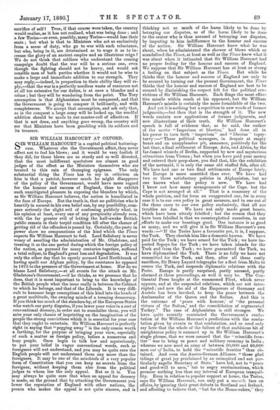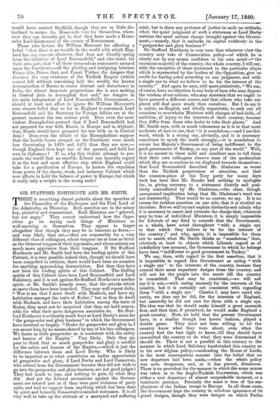SIR WILLIAM HARC017RT AT OXFORD.
SIR WILLIAM HARCOURT is a capital political battering- ram. to else the Government affect, they never affect not to feel his blows ; and it would be very foolish if they did, for those blows are so sturdy and so well directed, that the most indifferent spectators are almost as good judges of the effect as the Ministers themselves who are treated to this rain of thumping epigrams. The only substantial thing the Times has to say in criticism on him is that a patriot, however much he might disapprove of the policy of the Government, would have more regard for the honour and success of England, than to exhibit such unmitigated pleasure in exposing the blunders by which, as Sir William Harcourt believes, the nation is humiliated in the face of Europe. But the truth is, that no politician who is heartily in earnest in his own belief can, by any possibility, com- pare seriously the slight evil of confessing publicly what, in his opinion at least, every one of any perspicuity already sees, with the far greater evil of letting the half-awake British public remain in their torpid condition till after the chance of getting rid of the offenders is passed by. Certainly, the party in power show no compunctions of the kind which the Times expects Sir William Harcourt to feel. Lord Salisbury is never weary of assailing the administration of Mr. Gladstone, and treating it as the one period during which the foreign policy of the nation, as pursued for many centuries together, suffered a total eclipse, to England's great loss and degradation. It was only the other day that he openly accused Lord Northbrook of having spoilt our Afghan policy, by the resistance he opposed in 1875 to the pressure of the Government at home. Nor do we blame Lord Salisbury,—at all events for the attack on Mr. Gladstone's Government,—if he thinks, as we presume that he does, that it is most important to bring to the knowledge of the British people what the issue really is between the Cabinet to which he belongs, and that of the Liberals. It is very diffi- cult to hammer large conceptions of this kind into the heads of a great multitude, the swaying minds of a teeming democracy. If you think too much of the standers-by, of the European States who watch our party disputes, if you lower your voice in a sort of conventional decency, in order not to scandalise them, you will miss your only chance of imprinting on the imagination of the people the strong convictions which it is essential for your case that they ought to entertain. Sir William Harcourt is perfectly right in saying that " pegging away " is the only course worth a farthing, for the purpose of bringing your view, especially of such a matter as foreign policy, before a numerous and busy people. Once begin to talk low and mysteriously, to put your belief in vague conventional words, such as foreigners will not understand, and you may be quite sure the English people will not understand them any more than the foreigners. It may be one of the mischiefs of a very popular form of Constitution that you can keep no secrets from the foreigner, without keeping them also from the political judges to whom lies the only appeal. But so it is. You may always be quite sure that when an appeal for decency is made, on the ground that by attacking the Government you lower the reputation of England with other nations, the person who makes the appeal is not quite sincere, and is thinking not so much of the harm likely to be done by betraying our disputes, as of the harm likely to be done to the orator who is thus accused of betraying our disputes, by imputing to him indifference to the honour and success of the nation. Sir William Harcourt knew what he was about, when he administered the shower of blows which so scandalised the Times, at least as well as the Times knew what it was about when it intimated that Sir William Harcourt had no proper feeling for the honour and success of England. We suppose that Sir William Harcourt has at least as strong a feeling on that subject as the Times. But while he thinks that the honour and success of England are only to be secured by turning out the present Government, the Times thinks that the honour and success of England are best to be secured by diminishing the respect felt for the political con- victions of Sir William Harcourt. Each flings the most effec- tive missile within reach at his opponent, but Sir William Harcourt's missile is certainly the more formidable of the two.
And yet it is nothing but a repetition in new words of former judgments,—but then that is the strength of it. The new words contain new applications of former judgments, and new illustrations of their truth. Sir William Harcourt's speech is full of evidence that, as he said, the author of the motto " Imperium et libertas," had done all in his power to turn both " imperium" and " libertas " topsy- turvy :—" These political managers, in despair at empty boxes and an unapplausive pit, announce, positively for the last time, a final settlement of Europe, Asia, and Africa, by the far-famed wizards of Berlin, supported by new and mysterious attractions from Vienna ; but when you have paid your money and entered their peep-show, you find that., like the exhibition of the mermaid, it is only the same old stuffed fish, after all. We have had one or two final settlements of Europe lately, but Europe is more unsettled than ever. We have had two or three satisfactory policies in Afghanistan, but no one knows what the policy is now. We have had I know not how many arrangements of the Cape, but the Cape is not arranged at all." That is a summary of the whole position, and far from an exaggerated one, for in every case it is to our own policy in great measure, and in one out of the three cases to our own policy exclusively, that all our troubles are due. We have not only made great boasts, which have been utterly falsified ; but the reason that they- have been falsified is that we counterplotted ourselves, in our .efforts to make our boastings good. One instance is as good as many, and we will give it in Sir William Harcourt's own words :—" If the Tories have a favourite pet, it is, I suppose, the Turk. They cherish him like a domestic hysena. We have paid for the Turk ; we have armed for the Turk ; we have im- ported Sepoys for the Turk ; we have taken islands for the Turk and from the Turk ; we have guaranteed the Turk, we have diplomatised the Turk. There is no folly we have not committed for the Turk, and then, after all these costly sacrifices, Sir Henry Layard telegraphs for a fleet from Malta to coerce the Turk, and suspends diplomatic relations with the Porte. Europe is partly surprised, partly amused, partly alarmed at these proceedings, as well it may be. The Con- tinental Press laughs at the summoned Fleet, which never appears, and at the suspended relations, which are not inter- rupted ; and now the aid of the Emperors of Germany and Austria has been invoked, to keep the peace between the Ambassador of the Queen and the Sultan. And this is the outcome of peace with honour,' of ' the personal virtues of the Sultan,' and the consolidation of regenerated Turkey." The case of Afghanistan is still stronger. We have quite recently contrasted the Government's confu- tation of Sir William Harcourt's predictions with the confu- tation given by events to that confutation, and so need only say here that the whole of the failure of that ambitious bit of unrighteous policy is summed up in Sir William Harcourt's single phrase, that we were assured that the "scientific fron- tier " was to bring us peace and military economy in India ; whereas we now need an army of between 30,000 and 40,000 men out of India, to hold the "scientific frontier" thus ob- tained. And even the Austro-German Alliance, " those glad tidings of great joy proclaimed by an uninspired and not par- ticularly angelic Secretary of State," have led, not to "peace and good-will to men," but to angry recriminations, which promise nothing less than any interval of European tranquil- lity. Even in relation to popular support at home, the Tories, says Sir William Harcourt, can only put a smooth face on affairs, by ignoring their great defeats in Scotland and Ireland, and affecting to believe that, " but for the Home-rulers," they would have carried Sheffield, though they are so little dis- inclined to secure the Home-rule vote for themselves, when- ever they can decently get it, that they have made a Home- ruler Lord-Lieutenant of the county of Roscommon. Those who lecture Sir William Harcourt for affecting a belief "that there is no trouble in the world with which Eng- land has any concern whatever, that does not directly spring from the initiative of Lord Beaconsfield," and who insist, for their own part, that "all these tremendous armaments arrayed upon the Continent,—all the plotting and intriguing between Prince this, Prince that, and Count T'other, the dangers that threaten the very existence of the Turkish Empire (which cannot fall without convulsing half the world), the known determination of Russia to create distrust and disturbance in India, the almost desperate preparations she is now making in Central Asia to accomplish that end," are dangers in the main independent of Lord Beaconsfield's Government,— should at least not affect to ignore Sir William Harcourt's own sincere belief that so far as England is concerned, Lord Beaconsfield and his Secretary for Foreign Affairs are at the present moment the one serious peril. Does even the most violent Russophobist pretend that if Lord Beaconsfield had not prepared for war with Russia in Europe and in Afghani- stan, Russia would have prepared for war with us in Central Asia ? Does even the silliest of the Russophobists suppose that the hostile forces arrayed on the Continent were much less threatening in 1870 and 1871 than they are now,— though England then kept out of the quarrel, and held her own in diplomacy ? If so, why this violent attempt to per- suade the world that no sensible Liberal can honestly regard it as the best and most effective step which England could take for a pacification of Europe, to hasten the expulsion from power of the showy, weak, and insincere Cabinet which now affects to hold the balance of power in Europe, but which is really only a weight in the wrong scale ?



































 Previous page
Previous page